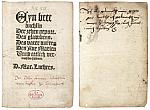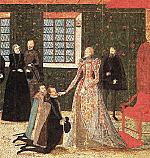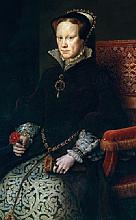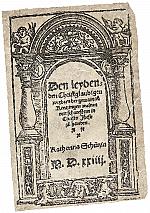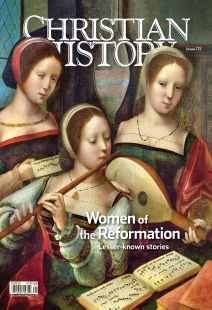“A very useful epistle”: Marie Dentière

[Dentière's name on the Reformer's Wall in Geneva]
BORN TO THE NOBLE d’Ennetière family in Tournai, Marie Dentière (1495–c. 1561) left an Augustinian convent in the early 1520s to join French advocates of church reform who had sought refuge in Strasbourg. She married Simon Robert, a former priest from Tournai; in 1528 they followed William Farel to the Swiss Valais, where she shared her husband’s ministry. Soon widowed with children, she married reformer Antoine Froment in 1533. Two years later they joined Farel in Geneva in the struggle to win that city for the Reformed. That year she is known to have exhorted Poor Clares to leave their order and renounce celibacy. But her greater fame was yet to come.
After the governing Council of 200 banished Farel and John Calvin from Geneva in 1538, Dentière published a pamphlet titled A Very Useful Epistle Composed by a Christian Woman of Tournai (1539) and addressed to Marguerite, queen of Navarre (see “Like mother, like daughter,” pp. 12–15). It attacked council members, but mainly targeted powerful French Catholic clergy who had not challenged Rome. Quickly confiscated, only two copies are known to have survived. It makes for powerful, subversive reading.
“Poor little women”
Dentière first deplored Calvin’s and Farel’s expulsions and the era’s general corruption. She addressed herself to two groups of women: those “in captivity” where the Reformed faith was persecuted, and “poor little women” wanting to know the truth. She acknowledged 1 Timothy 2 but defended women’s rights to interpret and teach the Bible anyway.
In part two of her pamphlet, Dentière described exemplary biblical women, refuted the notion that women are the source of evil, insisted again that they are able and entitled to interpret Scripture and teach one another, and called on biblical authority to defend their right to a public voice in religious matters. Her long final section recognized the Bible as the sole source of Christian doctrine, affirmed salvation through faith alone, attacked the Mass, and excoriated Catholic clergy and the papacy.
After the Epistle’s publication, the Genevan council worked to prevent the publication of other women authors, and Dentière appears only fleetingly in records, usually identified through her husband. For instance in September 1546, Calvin, writing to Farel described a confrontation with “Froment’s wife”—a “funny story” of Dentière preaching on the street corners and in taverns. When challenged by Calvin, she criticized him and his associates, accused them of being like the scribes in Luke 20:45, “who want to walk about in long robes,” and complained of their tyranny in suppressing open speech.
In his letter to Farel, Calvin dismissed Dentière derisively. But a 1561 copy of his sermon on 1 Timothy 2:8–12 carries a preface by an “M.D.” who criticized extravagant clothing and cosmetics. Ultimately, though, it is Dentière’s earlier letter that has most outlived her:
If God has given grace to some good women, revealing to them by his Holy Scriptures something holy and good, should they hesitate to write, speak, and declare it to one another because of the defamers of truth? Ah, it would be too bold to try to stop them, and it would be too foolish for us to hide the talent that God has given us, God who will give us the grace to persevere until the end.
By Mary B. McKinley
[Christian History originally published this article in Christian History Issue #131 in 2019]
Mary B. McKinley, professor emeritus of French, University of Virginia, editor of Marie Dentière: Epistle to Marguerite de Navarre and Preface to a Sermon by John Calvin, and coeditor of A Companion to Marguerite of Navarre.Next articles
Our first woman reformer
Argula von Grumbach proclaimed “no woman’s chit-chat, but the Word of God”
Peter MathesonChristian History Timeline: Women of the Reformation
The Reformation through women's eyes
the editorsNot a soap opera
The women of the English Reformation were active participants in a theological drama
Calvin LaneShe would follow only Christ
From pamphlet writing to pastoral counsel, Katharina Schütz Zell fought for her right to speak
Elsie McKee



